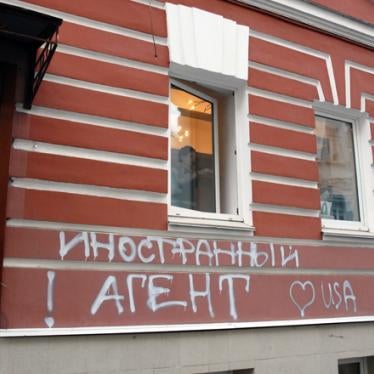(Moscow) – The Russian government in 2014 took a leap backwards demonstrating little respect for its human rights obligations, Human Rights Watch said today in its World Report 2015. The government expanded its crackdown on independent voices through even more restrictions on free expression.
New, draconian laws on nongovernmental organizations, the media, and the Internet, together with public smear campaigns against its perceived critics emerged as the government sought to control the narrative about developments in Ukraine.
“The Kremlin is trying to put a lid on things it does not want people to hear,” said Tanya Lokshina, Russia program director at Human Rights Watch. “It is essentially branding critics as enemies and pushing through a battery of laws and other measures to make them either invisible or illegal.”
In the 656-page world report, its 25th edition, Human Rights Watch reviews human rights practices in more than 90 countries. In his introductory essay, Executive Director Kenneth Roth urges governments to recognize that human rights offer an effective moral guide in turbulent times, and that violating rights can spark or aggravate serious security challenges. The short-term gains of undermining core values of freedom and non-discrimination are rarely worth the long-term price.
In late December, a court sentenced Oleg Navalny to three-and-a-half years in prison on politically-motivated fraud charges, in what appeared to be an effort to punish and control his brother and co-defendant, political opposition leader Alexei Navalny. The court handed Alexei Navalny a three-and-a-half-year suspended sentence.
New amendments to Russia’s law on nongovernmental organizations allow the government to register independent groups as “foreign agents” without their consent. Under a 2012 law, groups that receive foreign funding and engage in vaguely defined “political activities” must state they are “foreign agents,” which in Russia is understood to mean traitor or spy. In 2014 the authorities forcibly put 28 groups, including several leading human rights organizations, on the “foreign agent” registry. At least six groups chose to shut down. More are fighting for their survival, and dozens have been tied up in lawsuits with the prosecutor’s office or the Ministry of Justice.
Russian authorities blocked several independent media websites, adopted new laws, and proposed other measures that would further stifle freedom of expression. These include laws requiring bloggers with more than 3,000 daily visitors to register with Russia’s mass media oversight agency, banning commercial advertising on cable and satellite television channels, severely limiting foreign ownership of media, and prohibiting storing Russian Internet users’ personal data on foreign servers.
New laws also toughened penalties for involvement in unlawful public gatherings, including the introduction of up to five years in prison for repeat offenders. A dozen of activists remain behind bars, convicted of unjustified “mass rioting” charges for the 2012 protest at Bolotnaya Square that took place on the eve of President Vladimir Putin’s inauguration. A new amendment to criminal law upped the maximal punishment for “mass rioting” from 8 to 15 years of imprisonment.
Russian authorities have failed to prevent or prosecute homophobic violence. Attacks have spread since the adoption in 2013 of the federal law banning the distribution among children of “propaganda” for “nontraditional” sexual relationships, widely understood to be lesbian, gay, bisexual, and transgender (LGBT).
Abduction-style detentions, torture, and enforced disappearances persisted in the North Caucasus, as did attacks against government critics. After a December 2014 insurgent attack on Grozny, the Chechen leader, Ramzan Kadyrov, publicly ordered collective punishment against insurgents’ families, including destroying their homes. Following on his call, local security officials reportedly destroyed at least 15 houses belonging to relatives of insurgents. Security forces across Dagestan raided Salafi homes and mosques, detained hundreds of Salafis for questioning, subjected some to forced DNA testing, and carried out protracted and very abusive special operations.
In a positive development, the parliament approved legislation to expand mandatory accommodations for people with sensory and physical disabilities and to prohibit disability-based discrimination. At the same time, tens of thousands of children with disabilities remain warehoused in orphanages, where they experience violence, neglect, and other abuse.







